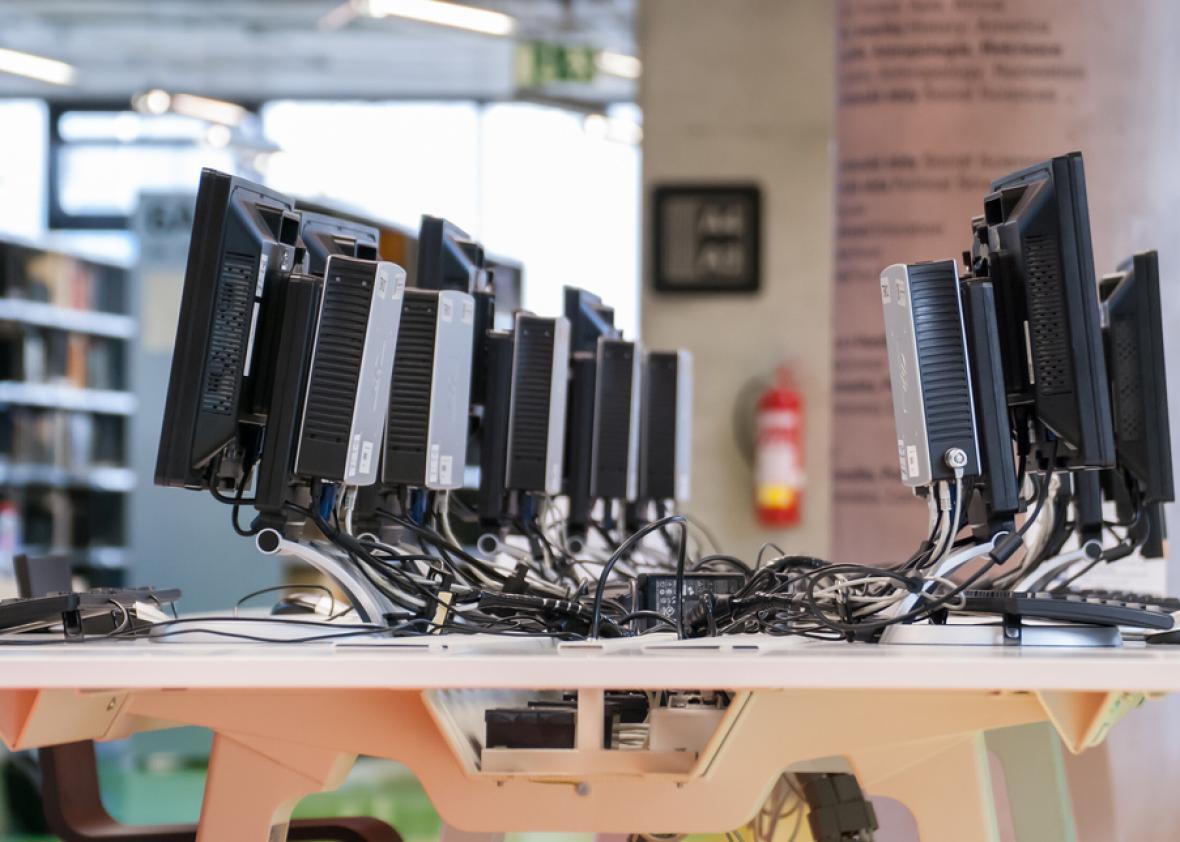Board meetings of the Lebanon Libraries in the small town of Lebanon, New Hampshire, don’t normally include signs that read “Down with Big Brother” and “DHS is not the boss of my library.” But Tuesday night’s meeting was special: Dozens of community members voted unanimously to reinstate the library’s Tor relay, a project that had been suspended after law enforcement intervention. When library director Sean Fleming declared that the relay would go back online, a huge round of applause rang out. The citizens of Lebanon fought to protect privacy and intellectual freedom from the Department of Homeland Security’s intimidation tactics—and they won.
Earlier this summer, Library Freedom Project, an initiative that brings anti-surveillance trainings and technologies to libraries and their local communities, announced the pilot of a new project aimed at installing Tor exit relays in libraries. We’re hardly neutral observers here: We are both activists with the Library Freedom Project, and one of us—Alison—helped craft the plan for Tor exits in libraries. So we’re both familiar with the occasional clashes between the government and libraries—for instance, librarians were at the fore of public opposition to the USA PATRIOT Act’s expansion of federal surveillance powers, particularly when a group of Connecticut librarians sued the U.S. government for the right to disclose to patrons that the feds demanded the library share private patron information. But what happened in New Hampshire was particularly bizarre and frustrating.
Tor is a service that helps protect your anonymity online by obfuscating your identity from other users, governments, or corporations. Domestic violence survivors use Tor to hide their online lives from their abusers. Journalists reporting on repressive conditions depend on it. Activists fighting against everything from police brutality to environmental collapse use Tor for blogging, organizing, and mobilizing. And people who simply want to opt out of mass surveillance or corporate tracking use it, too.
This powerful piece of technology relies on volunteer-run relays; the more people who host a relay in diverse locations worldwide, the stronger and safer the network becomes. Libraries are ideal locations to host these relays: Not only do they typically have fast and reliable Internet connections, but they have a long legacy of protecting anonymity and access to information.
Some think that libraries are less important in a world of Google and Kindles, but the truth is that they are more important than ever. Lebanon has a population of about 13,000 and two libraries. The median income is less than $30,000 a year, and more than 13 percent of those under the age of 18 live below the poverty line. Many residents of Lebanon who cannot afford reliable Internet connections at home depend on the library’s technology services.
Kilton Library, a branch of the Lebanon Libraries, hosted the pilot. Soon after the pilot began, it received media coverage from Vice and Ars Technica. That generated enough attention, apparently, to warrant concern from the Boston division of the Department of Homeland Security. Boston DHS then contacted the local police in New Hampshire to warn library staff that Tor is used for criminal activity. Yes, sometimes Tor is used for crime—but so are cars, and kitchen knives, and lots of other things. Nevertheless, the library director made the decision to suspend the relay project.
In response to this law enforcement pressure, the Library Freedom Project, the Massachusetts and New Hampshire affiliates of the American Civil Liberties Union, and the Tor Project drafted an open letter urging the Kilton Library community to put the relay back online. As soon as Kilton Library and the Library Freedom Project went public about DHS’s fearmongering, the outpour of support for the library exploded. The Electronic Frontier Foundation even launched a petition to help people rally behind the effort to defend Kilton Library’s participation in the Tor network. Supportive calls and emails poured in. Particularly exciting for us was that dozens of libraries and their community members also contacted Library Freedom Project hoping to set up their own Tor exit nodes, a number of technologists spun up new relays in solidarity, and a flurry of media attention followed. The local newspaper wrote an editorial in support of Kilton’s Tor setup.
DHS’s confrontation with the Kilton Library comes at a time when technology companies are increasingly unwilling to comply with the federal government’s surveillance demands, and the federal government has been increasingly vocal about their adversarial relationship to online privacy. FBI Director James Comey has been pleading with tech firms for backdoor access into encrypted communications, a move that technologists and lawyers say would violate the Fourth Amendment and make our technologies more vulnerable to malicious hacking.
Many of the Snowden leaks contained specific information about efforts to crack Tor’s encryption and undermine user attempts at protecting their online privacy—even going so far as to naming one of the leaked presentations “Tor Stinks.”
It’s unclear why the Department of Homeland Security, a federal agency tasked with responding to terrorist attacks that was created in the wake of 9/11, is concerned with libraries popularizing and providing tools for patrons to stay safe online. We hope to find out soon: Muckrock, the Electronic Frontier Foundation, and the ACLU have all filed Freedom of Information Act and Right to Know requests to try to understand more about the government’s motivation in discouraging the small New Hampshire library to support privacy-enhancing software.
This week’s victory for Lebanon Libraries is a sign of hope in a post-Snowden world. ”Our community has spoken loudly in favor of intellectual freedom and free speech, and we’re pleased to be able to support them by reinstating our Tor relay,” said Chuck McAndrew, IT librarian for Lebanon Libraries, told us.
If you want to take a stand for privacy, you could start by asking your local library to set up a Tor exit node. Because even if you haven’t checked out a physical book in years, your community still needs libraries to provide information—and the global Internet community needs libraries to stand up for people’s rights.
